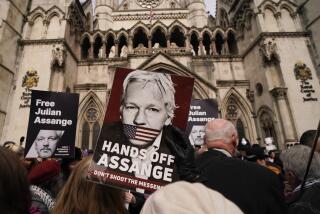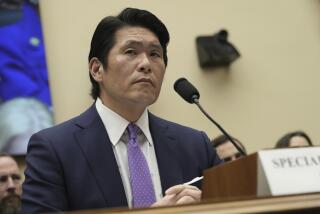Bradley Manning takes stand in WikiLeaks hearing
FT. MEADE, Md. — Pfc. Bradley Manning swiveled in the witness chair, smiling and occasionally talking over his lawyer. In his Army dress-blue uniform, he appeared even younger than his 24 years.
It was difficult to reconcile the bespectacled Manning’s relaxed, almost chatty demeanor with the vast charges against him — perpetrating one of the biggest leaks of classified material in U.S. history.
Manning is accused of providing the anti-secrecy Internet group WikiLeaks with hundreds of thousands of U.S. diplomatic cables and classified war logs from Afghanistan and Iraq while based in Baghdad as a military intelligence analyst in 2009 and 2010. If convicted, he could face life in prison.
The military judge, Col. Denise Lind, accepted terms Thursday under which Manning could plead guilty to a series of lesser counts of providing classified information to WikiLeaks, including a battlefield video file, dozens of war logs, and other classified material.
Manning could enter the plea — which includes a maximum of 16 years in prison — as soon as next month. It wasn’t immediately clear whether prosecutors would continue to pursue the more serious charges, which experts have said will be harder to prove.
His appearance Thursday at pretrial proceedings at Ft. Meade, outside Washington, marked the first time he had testified in his defense in more than 900 days in military custody.
“I remember thinking, ‘I’m going to die,’” Manning said of his first days in a tiny cell at a U.S. military base in Kuwait in the summer of 2010, before his transfer to the United States. “‘I’m stuck here in this cage and I don’t know what’s going to happen.’ I thought I was going to die in that cage. And that’s how I saw it, as an animal cage.”
Defense attorneys are hoping to persuade the judge to dismiss most or all of the charges, arguing that the conditions Manning endured when he was in solitary confinement for nine months in the Marine Corps brig at Quantico, Va., constituted illegal punishment.
During that time, Manning was stripped of his clothing, forced to sleep naked for several nights, and required to stand naked at attention one morning. Military officers have testified that Manning was deemed at risk of harming himself or others, warranting the “maximum custody” designation at Quantico, beginning in July 2010.
Military prosecutors are expected to argue that the release of the classified material directly harmed national security.
Lind said the government would declassify digital material related to the case that was found at Osama bin Laden’s compound in Pakistan, but didn’t specify what the material was.
But those issues took a back seat Thursday to mundane details of Manning’s imprisonment — including his interest in current events, his preference for John Grisham novels, and his penchant for conducting imaginary sword fights and making faces at himself in the mirror in his 48-square-foot Quantico cell.
Military doctors said the behavior showed Manning’s fragile mental state and bolstered their argument that he should remain under “prevention of injury” status, which included visual checks by guards every five minutes.
A psychiatrist who evaluated Manning each week beginning in January 2011, however, testified that officials at Quantico ignored his recommendations that Manning wasn’t a suicide risk.
“It was my opinion that he had little or no clinical risk of self-harm,” said Col. Ricky Malone, a forensic psychiatrist based at Walter Reed Medical Center in Washington.
Asked by his lawyer, David Coombs, to explain his actions, Manning said it was the result of “sheer out-of-my-mind boredom.”
“It was pretty draining. It was tiring,” Manning said about his imprisonment at Quantico. “I spent a lot of time looking for things to stay active and keep my mind from going back to a state similar to [custody in] Kuwait. I tried to feel as much as [possible] like I wasn’t trapped in a cell or a cage.”
In April 2011, Manning was moved from Quantico to Ft. Leavenworth, Kan., where he was reevaluated and designated a medium-security detainee. Lt. Col. Dawn Hilton, then the commander of the Kansas correctional facility, testified by phone that Manning was a “typical” detainee who “followed the rules” and “did what he was told.”
At one point during his testimony, Coombs asked Manning to step off the witness stand, remove his jacket and put on a “suicide smock” — the tear-resistant garment in which he was required to sleep while on suicide watch for two weeks after his arrival at Quantico. One night, Manning recalled, his arms got stuck and he had to call one of the guards — who were posted directly outside his cell around the clock — to free him from the garment.
Other times, guards would wake him up in the middle of the night if they couldn’t see his face. He had no sheets or blankets, he said. If he wanted soap or toilet paper, he had to stand and ask for it.
Coombs asked Manning whether he recalled one episode cited by the brig’s commanders: that one night, while sleepwalking, Manning licked the metal bars of his cell. Manning said he didn’t remember that.
More to Read
Start your day right
Sign up for Essential California for news, features and recommendations from the L.A. Times and beyond in your inbox six days a week.
You may occasionally receive promotional content from the Los Angeles Times.







